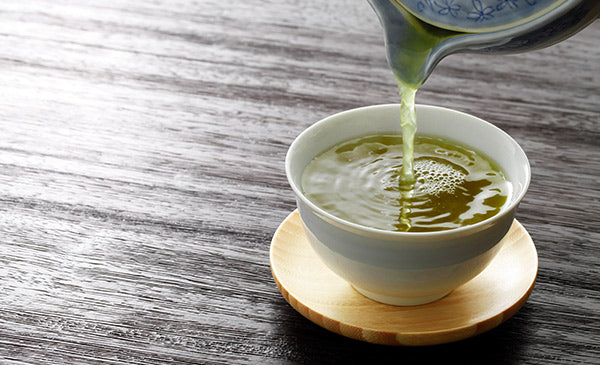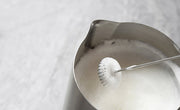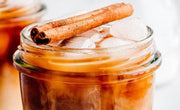How to Make Green Tea Taste Good

We love drinking green tea for all of its health benefits. Made from the Camellia sinensis plant, green tea is full of antioxidants and catechins that help protect your cells against free radicals, which may play a role in heart disease, cancer, and other diseases. Green tea an unoxidized tea that is a great source of amino acids that are responsible for building protein chains that play a big supporting role in nearly every part of your body. This amazing leaf also contains vitamins, minerals, and fiber.
Studies on green tea have shown that it aids in your body's immunity and overall well-being. It has anti-inflammatory, anti-arthritic, and antibacterial properties and may help prevent cancer and cardiovascular disease, as well as help lower cholesterol levels. With a powerhouse like this, who wouldn't want to enjoy a few cups of green tea a day?
Many people avoid green tea because the taste is just too bitter for their tastebuds.
Why does green tea taste bitter?
Bitterness (aka astringency) is a characteristic of green tea that some people love, but for some it's just plain bitter. The appreciation of the astringency is more of an acquired taste.
A common cause of bitter tea is due to over-brewing. It most often can occur with green or white tea, and less often with black, herbal, rooibos, and dark oolong tea. Those healthy compounds called catechins along with the chlorophyll in green tea are to blame for the bitter flavor.
It could also be due to the fact that some types of green tea are just more bitter than others. If you are new to tea or just learning how to brew green tea, flavored green tea blends are a great choice. The addition of fruit or flower in a green tea blend will soften the astringency and bitterness, allowing the delicious flavors to come through.

How to improve the taste of green tea
Switch to loose leaf tea
The number one secret to better tasting tea is to ditch the green tea bags. One of the most important factors in selecting loose tea is selecting quality loose tea like you get from Tealeavz. The dust and fannings (small tea particles) in teabags brew faster than large loose tea leaves releasing the bitter compounds and tannins more quickly than loose leaf tea creating a bitter cup.
Check your water temperature
Green tea leaves are more delicate and don't require high water temperatures. Steeping green tea in water that is too hot will extract more catechins, caffeine, and chlorophyll - three of the causes of the bitterness. By using cooler water, the compound L-theanine is able to release exposing its light and savory notes.
Never, ever use boiling water or a microwave to brew high-quality loose leaf green tea. These methods are too harsh just destroy the flavor of the delicate leaves and you may as well just be using teabags.
Watch your time
As one of the most delicate tea types, green tea needs to be brewed with care. The optimum steeping time for green tea is 2-3 minutes. Tealeavz provides a handy chart on every pouch of tea with suggested steep times and temperatures. If you are making multiple infusions, you can add 20-30 seconds for each subsequent steep.
A common mistake made when trying to intensify the flavor is to brew the tea leaves longer, which we all now know only adds to bitterness. For a more intense flavor, use more tea leaves. However this too can result in a strong, bitter brew, so don't go overboard with how much tea you add.
For the best tasting cup, start with one teaspoon of green tea leaves per eight ounces of water and adjust it to your preference.
A few other tips for reducing bitterness of green tea:
- Steep with filtered water - Hard or treated water can affect the flavor of your tea.
- Use fresh water - Water that has been sitting can absorb odors that can affect the taste.
- Select a proper infuser - Tea leaves need space to expand. A small, crowded tea ball does not allow the leaves to unfurl and can this too can affect the taste.
Enjoy it while it's still hot
As hot brewed tea cools, the flavor can become more bitter, so as they say "get it while it's hot". An exception to this is if you are cold brewing the tea. If you notice a color change in your cup to a dark yellow or even brown, it has been sitting too long.

How else can I make green tea taste better?
If these brewing steps still leave you feeling bitter, try adding other ingredients to satisfy your tastebuds.
Try a green tea blend
Blending pure green tea with other ingredients will modify the grassy flavor associated with green tea. Genmaicha is a Japanese green tea that has been blended with toasted, popped brown rice. The addition of the popped rice reduces the astringency of the green tea and creates a sweet and nutty flavor. It is considered an easy-to-drink green tea.
Add mint
If you feel that your cup of tea is tasting plain, add some natural flavor add some mint leaves in your steep to add a new level of flavor. Jade Citron Mint is a delicious green tea blended with spearmint, lemongrass, and zest of citrus making it both vibrant and refreshing.
Add lemon
Lemon is a natural way to reduce the bitterness in green tea, without adding any calories or sugar. Another bonus is that studies have found by adding lemon juice to your green tea will help your body absorb the antioxidants and catechins instead of releasing them through digestion.
Add ginger
Ginger is a spice commonly used spice in tea. It perks up the flavor and is great to help combat flu or cold-like symptoms. The fragrance can help open clogged sinuses, and give your body additional health benefits. Be careful how much ginger you add or it could make your cup a bit sour.
Add cinnamon
Cinnamon is typically found in chai giving it the spiciness chai lovers crave. Cinnamon also helps energize and give your mood an uplift. The warming aroma also provides an aromatherapy effect.
Add honey
This isn't a new trick. Honey is well-known natural home remedy, but it also makes a perfect tea sweetener. It's another alternative to sweeten a bitter cup of green tea that's all-natural!
Add maple syrup
Using maple syrup to sweeten your cup is a growing trend because it also provides additional minerals, nutrients, and antioxidants. Choosing maple syrup or Belgian rock sugar over granulated sugar is simply the healthier choice.
Turn it into a latte
Another green tea that can display a bit of a bitter, grassy flavor is matcha. You know how delicious matcha lattes are, so if you have over-brewed a cup of green tea, add some warm milk, whisk it, and add it to your tea. Sprinkle in a little Belgian rock sugar to add sweetness without altering the flavor of the tea leaves.
Cold-brew it
Cold brewing tea also helps avoid bitterness in your cup. Learn more about how to cold brew green tea and enjoy your next glass of iced green tea!





